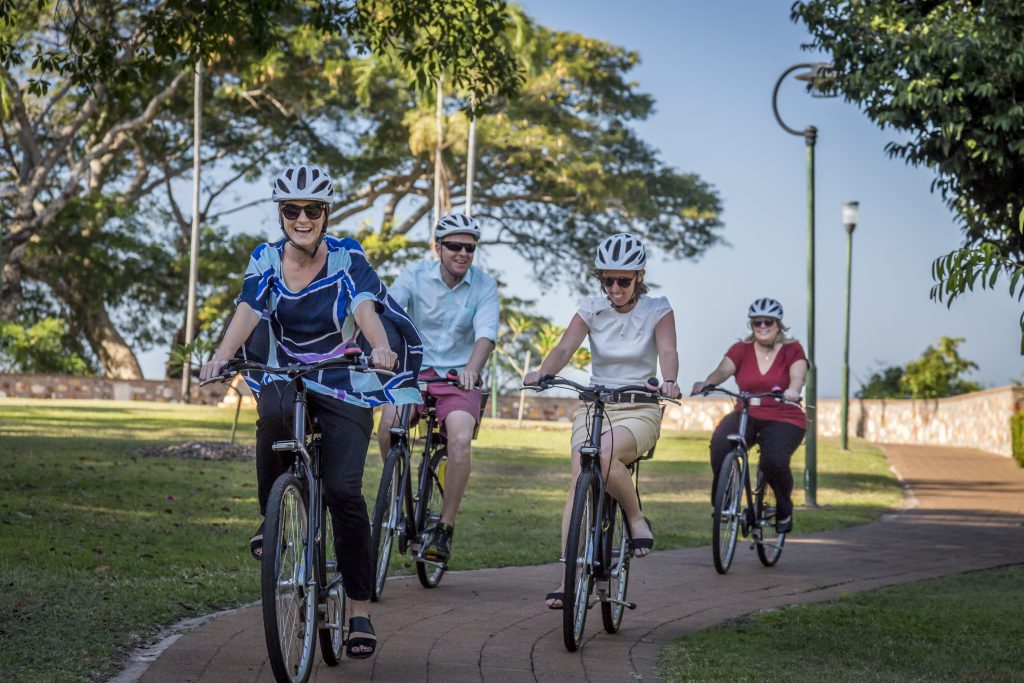Cool ways to get
around Darwin
Active transport
Active transport refers to non-motorised forms of travel, particularly walking and cycling, which when used for local trips instead of the car can provide a number of benefits:
- Improve physical and mental health by increasing physical activity1, 2, 3
- Reduce greenhouse gas emissions4
- Reduce transport costs for Darwin households
- Reduce parking demand and revitalise commercial areas5
Image: Visitors cycling along The Esplanade after hiring bikes from a Spinway station.

Opportunities in Darwin
Darwin when compared to other Australian cities has relatively high levels of cycling to work and this has been growing in many areas over the last five years. The 2016 ABS census showed that active transport is most frequently used in Darwin for trips to work that are 10 kilometres or less. The use of active transport for daily trips such as commuting or going to the shops can reduce transport costs for Darwin households, which on average account for 13% of households’ weekly expenditure. Active transport for daily trips can also help the Darwin community achieve minimum recommended levels of physical activity per week. In Darwin around 66% of households are not getting the recommended amount of exercise per week, which is associated with increased risk of chronic diseases and obesity.
A national survey of cycling found that for Northern Territory households the most common reason that respondents provided for why they have not cycled to work or school over the last year was that the distance was too far. Survey respondents identified that local government improving connectivity between bike paths and schools, while also providing off-road bike paths, would be the most influential actions in encouraging more bike riding6.
- 70% of Northern Territory households have access to at one least working bicycle, which is higher than the national average6.
- 13% of Darwin households’ budgets, on average, is spent on transport costs
- 66% of Darwin households are not getting the recommended amount of exercise per week
Image source: ABS 2016 Census

What about the heat?
Darwin’s climate extremes, particularly the high humidity and rainfall during the build-up and wet season, is often mentioned as a barrier to increased levels of active transport. However, bike counters demonstrate that there is not a significant difference in bike traffic between the wet and the dry seasons. This might indicate that for those who do cycle, like most transport choices, it becomes a habit and they are able to adapt so that onset of the wet season does not deter them from continuing to cycle. Female participation in cycling is often used as an indicator of network accessibility7. The bicycle census found that 30% of cyclists in Darwin were female while the national average for female participation in 2019 was 25%.
E-scooters
E-scooters are another mobility option that can reduce reliance on cars to reduce congestion and parking demand, extending mobility to those without cars and reduced emissions. E-scooters are also seen as an approach to activate a city by providing a flexible and enjoyable approach to getting around the city8. However, there is the potential for conflict with cycling and walking due to the increased speed and potential cluttering of footpaths, which can raise safety concerns. This highlights the need for appropriate planning controls and legislation to minimise conflicts from the introduction of e-scooters and e-bikes. The City of Darwin is currently running a trial of e-scooters in the CBD, Waterfront and Cullen Bay. This trial will be monitored and evaluated to consider the potential to expand the use of e-scooters in Darwin.
References
- Kornas, K.; Bornbaum, C.; Bushey, C.; Rosella, L., Exploring active transportation investments and associated benefits for municipal budgets: a scoping review. Transport Reviews 2016, 1-23.
- Shannon, T.; Giles-Corti, B.; Pikora, T.; Bulsara, M.; Shilton, T.; Bull, F., Active commuting in a university setting: Assessing commuting habits and potential for modal change. Transport Policy 2006, 13, (3), 240-253.
- Chng, S.; White, M.; Abraham, C.; Skippon, S., Commuting and wellbeing in London: The roles of commute mode and local public transport connectivity. Preventive Medicine 2016, 88, 182-188.
- Woodcock, J.; Edwards, P.; Tonne, C.; Armstrong, B. G.; Ashiru, O.; Banister, D.; Beevers, S.; Chalabi, Z.; Chowdhury, Z.; Cohen, A.; Franco, O. H.; Haines, A.; Hickman, R.; Lindsay, G.; Mittal, I.; Mohan, D.; Tiwari, G.; Woodward, A.; Roberts, I., Public health benefits of strategies to reduce greenhouse-gas emissions: urban land transport. The Lancet 2009, 374, (9705), 1930-1943.
- Litman, T. A., Economic Value of Walkability. Transportation Research Record 2003, 1828, (1), 3-11.
- Austroads Australian Cycling Participation 2019. https://austroads.com.au/publications/active-travel/ap-c91-19 (April 2020),
- Heesch, K. C.; Sahlqvist, S.; Garrard, J., Gender differences in recreational and transport cycling: a cross-sectional mixed-methods comparison of cycling patterns, motivators, and constraints. International Journal of Behavioral Nutrition and Physical Activity 2012, 9, (1), 106.
- Gössling, S., Integrating e-scooters in urban transportation: Problems, policies, and the prospect of system change. Transportation Research Part D: Transport and Environment 2020, 79, 102230.
ACKNOWLEDGEMENT
Your Tropical City acknowledge the Larrakia people as the Traditional Owners of the Darwin region and pay our respects to Larrakia elders past and present. We are committed to a positive future for the Aboriginal community.
564 Vanderlin Drive,
Berrimah NT 0828
(08) 8944 8436
hello@yourtropicalcity.com.au
PARTNER
ACKNOWLEDGEMENT
Your Tropical City acknowledge the Larrakia people as the Traditional Owners of the Darwin region and pay our respects to Larrakia elders past and present. We are committed to a positive future for the Aboriginal community.
CONTACT
564 Vanderlin Drive,
Berrimah NT 0828
(08) 8944 8436
hello@yourtropicalcity.com.au
PARTNER